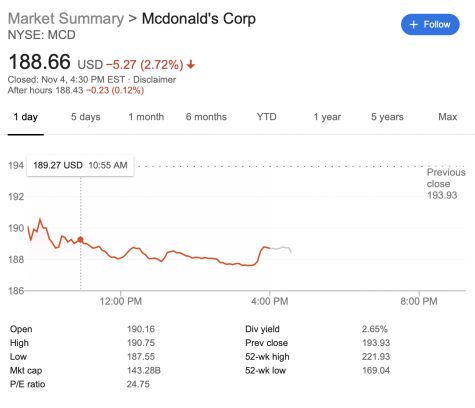McDonald’s Stocks Down After Firing of CEO
November 7, 2019
This Sunday, McDonald’s announced the firing of their CEO, Steve Easterbrook, due to having a relationship with an employee.
The relationship was consensual, however, it was a violation of Corporation Policy. Due to this controversial incident, McDonald’s stock has fallen about 2.67%, equaling about $4 billion in value.

McDonald’s Corporation market summary shows a decrease in stock value for about 2.72%. (Google Finance)
Why are stocks down?
The general reason that stock prices decline after a major incident within a company is fear.
Investors may fear that the given company will not be able to recover from an incident. Investors may also fear litigation. In situations, like this one, that include the firing of a major figure, a lawsuit against said corporation would not be uncommon. These hesitations cause investors to be unwilling to pay more for their share, causing share prices to decline.
The sudden change of CEO is major for McDonald’s. Easterbrook’s replacement, Chris Kempczinski, told the Wall Street Journal, “There isn’t going to be some radical, strategic shift. The plan is working,” however investors may worry about his lack of preparation for the CEO position.
Investors were generally very happy with Easterbrook’s strategy. During his leadership, Easterbrook is credited for advancing the corporation in elements of technology, administration processes, and actual food improvements.
All of these factors contributed to McDonald’s stock to be up (meaning investors are interested and “eager to buy”) about 9.2% in the last year. When a company is thriving and advancing, stock prices are likely to stay up.
Why does this matter?
Obviously this stock decrease will affect the investors of McDonald’s Corporation. A decrease in stock value does not mean that the investors are losing money right now, rather it means investors are lacking confidence in the company.
However, if these leadership changes cause a permanent weakened business, the stock prices will decrease and semi-permanently become less valuable. Analysts will watch to determine whether or not this change is a permanent result of the firing or just a fluctuation.
Aside from just investors, the stock market affects everyone. The stock market plays a role in pensions, bonds, and employment.
Though the stock market is not the economy, it is a reflection of the economy. It allows individuals to play a part in massive-success. Kimberly Amadeo, the US Economy Expert for The Balance, said, “Without stocks, only large private equity investors could profit from America’s free market economy.”
The stock market allows companies to grow and advance, which in turn creates a thriving economy. A thriving economy provides jobs, income, and accessible services; benefiting everyone.






